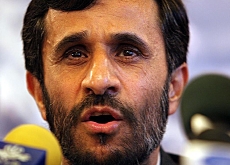
Iran president’s comments “self-serving”

As Jewish groups urge action against Iran, a former Swiss ambassador to Tehran tells swissinfo the Iranian president's Holocaust denial is political posturing.
Tim Guldimann said Mahmoud Ahmadinejad’s comments were not representative of the Iranian regime or people.
Ahmadinejad’s tirade about the Holocaust being a “myth” drew widespread condemnation from the international community – including Switzerland – and calls for United Nations intervention.
The foreign ministry said it would not tolerate any doubt being cast on the Holocaust and has summoned the Iranian ambassador to its office in Bern twice.
In a joint statement, two Swiss Jewish organisations said it was “intolerable that the president of a UN member state could utter such revolting insanities”. They urged the UN to take action against Iran.
On Thursday around 200 protesters staged a demonstration outside the Iranian embassy in Bern.
They called on the Swiss government to push for an urgent debate at the UN Security Council.
In October the Iranian president provoked an international outcry when he said that Israel should be “wiped off the map”.
Guldimann served as Swiss ambassador to Tehran from 1999 to 2004. swissinfo asked the former ambassador for his take on events.
swissinfo: What is Mahmoud Ahmadinejad trying to achieve through these comments?
Tim Guldimann: This anti-Zionist, anti-Israeli tradition was an important aspect of the 1979 [Islamic] revolution and it could even be that these comments reflect Ahmadinejad’s personal convictions.
Secondly, it could also be that he is using these remarks to foster his political position. The potential political forces against him are split; they are not united at all.
By provoking very harsh criticism abroad, very harsh attacks against Iran, Ahmadinejad could count on enforced solidarity from the regime.
Ahmadinejad is not number one in the country, his position is comparable to the prime minister in other countries. The religious leader Ayatollah Ali Khamenei is the supreme leader and he has already been critical of his president’s comments on Israel.
So I don’t want to say that it’s mere tactics, it’s also a part of a radical thinking and the way he is.
swissinfo: What is the best way for the United States, Europe and Israel to respond to this provocation?
T.G.: I do not think that this posturing will provoke any military response, although Israel and Washington have mentioned this threat. However, it is absolutely clear that such things have to be taken seriously.
Ahmadinejad spoke about Israel being wiped off the map. He does not say that he would do it but that doesn’t matter. These are very dangerous radical positions and must be denounced.
On the other hand one has to be careful not to enter the game of supporting him by attacking him and remember that he is not the Iranian regime, he is part of it.
The Iranian regime should be allowed to try to sort this problem out. It is not worth antagonising them at the international level as this will make the internal solution more difficult.
swissinfo: Are Ahmadinejad’s views representative of the regime?
T.G.: This radicalism is not mainstream, neither in the regime nor in the population. Neither wants to have such confrontation with the outside world.
We should not exaggerate the current episode. There’s no question of the Iranian regime entering into any political military adventure against Israel.
swissinfo: Where does this leave the ongoing negotiations about Iran’s nuclear programme?
T.G.: Since the IAEA [International Atomic Energy Agency] meeting on September 24, there has been some progress in the Iranian attitude. They opened a military site to IAEA inspectors and delivered some documents on past connections with the Pakistani nuclear expert A.Q. Khan.
As far as cooperation between Iran and the IAEA is concerned, it is not working too badly and it has to be said that Iran has gone very far in opening up its doors to IAEA inspections. I don’t know of any other country being so intensively investigated by IAEA inspectors.
The main issue is uranium enrichment, pursued by Iran, but not acceptable for the West. The general lack of confidence creates a situation where the international community is much harsher with Iran when it comes to the nuclear programme than with other countries.
swissinfo: Are you optimistic that conditions will improve in Iran both in terms of relations with the rest of the world and life for the general population?
T.G.: I’m not specifically optimistic for external relations but one should not exaggerate. It could well be that nothing special will develop from this political row and the quarrels will go on.
It will also depend on whether Ahmadinejad can mobilise oil money to build up his constituency among the population by social spending, above all in the provinces.
That could win him popularity and foster his political position because he won’t achieve that through external radicalism.
Mahmoud Ahmadinejad, Tehran’s ultra-conservative mayor, won the presidential elections in June 2005, replacing Mohammad Khatami after eight years.
Ahmadinejad provoked an outcry in October when he called for Israel to be “wiped off the map”.
Last week he expressed doubt about Nazi Germany’s slaughter of six million European Jews during the Second World War.
On Wednesday he went a step further claiming the Holocaust was a “myth” created to justify the establishment of the state of Israel.

In compliance with the JTI standards
More: SWI swissinfo.ch certified by the Journalism Trust Initiative

















![The four-metre-long painting "Sonntag der Bergbauern" [Sunday of the Mountain Farmers, 1923-24/26] had to be removed by a crane from the German Chancellery in Berlin for the exhibition in Bern.](https://www.swissinfo.ch/content/wp-content/uploads/sites/13/2025/12/01_Pressebild_KirchnerxKirchner.jpg?ver=8f77363a)












You can find an overview of ongoing debates with our journalists here . Please join us!
If you want to start a conversation about a topic raised in this article or want to report factual errors, email us at english@swissinfo.ch.